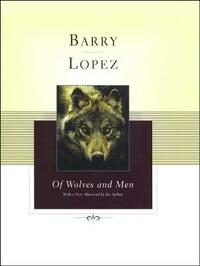Take a photo of a barcode or cover
challenging
dark
hopeful
informative
inspiring
reflective
sad
medium-paced
informative
slow-paced
I picked this up after hearing about the wolf pup in Wyoming who was run down by a man, Cody Roberts, on snowmobile. Still alive but grievously injured, Roberts proceeded to a fix a shock collar around the pup’s neck and secure her muzzle with red duct tape. He transported the wolf to a bar where he showed his catch off to all its patrons. What in humans is the cause of such heinous cruelty and hatred towards wolves?
Lopez does a thorough job of tracing the history of the relationship between humans and wolves. I did not much enjoy the final third of the book in which he traces the casting of wolves in fable, folktale, and literature, but I am fuller for it, all of it.
Lopez does a thorough job of tracing the history of the relationship between humans and wolves. I did not much enjoy the final third of the book in which he traces the casting of wolves in fable, folktale, and literature, but I am fuller for it, all of it.
challenging
informative
reflective
slow-paced
I am not sure why this book has so many great reviews. I liked some of it, but most of it was kind of sad and depressing. There was not a lot of new information, and I assume that is because so much more research has been done since this book was published. I did learn more about the mythology of wolves from other countries, but I couldn't help thinking about how barbaric and ignorant man was/is about wolves. The part about Native Americans and wolves was interesting, but some of the stories seemed very brief and incomplete. There are dozens and dozens of stories about the murder and mutilation of wolves (mostly about the American's fight to abolish them from the landscape,) but I was already educated in this area, so I did not see the point in reading more about these horrendous acts.
I wanted to like this book more, but just wasn't really taken by it. Some interesting anecdotes and notes about wolves nonetheless.
Beautifully and respectfully written, also quite informative.
informative
sad
slow-paced
I really enjoyed this book even though parts of it were difficult to read. I find wolves to be very interesting and this book was full of detail. The parts about what we have done to them is what saddened (and angered) me and were the difficult parts.
An extraordinary book, one that I must highly recommend not only for anyone with an interest in wolves, but also for anyone interested in humanity’s complicated and often frustrating history with wildlife. The first section of the book, giving as complete a description of the wolf as is possible, is the most enjoyable to read, and will debunk many of the common misconceptions popular knowledge insists on. The following sections detail different aspects of how human civilizations have (mis)understood and treated wolves; these sections are harder to read because the content is more frequently tragic. However, they are no less important to read if one is to understand the state of wolves today.
The section on the Middle Ages was a little disappointing, in that Lopez (not a medievalist) seems to buy into popular ideas that they were a uniquely depressing, oppressive, and ignorant time, caught between the lights of Rome and the modern era. He may be right about how medieval culture in general viewed the wolf, but I am less confident that he really understands the context of the time. Still, he wrote this in 1978, when his view was more standard, I believe, and frankly medievalists are still fighting against that perception. The section of the book certainly isn’t bad: there’s a lot of good research into medieval bestiaries and other texts, and overall Lopez’s conclusions about the medieval view of wolves do help me understand the attitudes of later eras, since they are so closely linked.
It also must be said that, in addition to being a good researcher, Lopez is also a very, very good writer. His style is clear and sometimes beautiful. He is organized, but has a heart for the poetic. And I was grateful for his sensibilities and humility. He values the testimonies of tribespeople who have lived around wild wolves for centuries almost as much as careful scientific research, and is quick to assert that it is folly to assume that human science can fully explain anything in the natural world.
“Many of us now seem to subscribe to the idea that wild animals are not mechanisms. They cannot be summed up, any more than Homo sapiens can be summed up. Wild animals are intricately fitted in the world, and intricacy that, many speculate, goes further and deeper than the the catch nets of Homo sapiens’ neurological capacity to conceive.” (293)
The section on the Middle Ages was a little disappointing, in that Lopez (not a medievalist) seems to buy into popular ideas that they were a uniquely depressing, oppressive, and ignorant time, caught between the lights of Rome and the modern era. He may be right about how medieval culture in general viewed the wolf, but I am less confident that he really understands the context of the time. Still, he wrote this in 1978, when his view was more standard, I believe, and frankly medievalists are still fighting against that perception. The section of the book certainly isn’t bad: there’s a lot of good research into medieval bestiaries and other texts, and overall Lopez’s conclusions about the medieval view of wolves do help me understand the attitudes of later eras, since they are so closely linked.
It also must be said that, in addition to being a good researcher, Lopez is also a very, very good writer. His style is clear and sometimes beautiful. He is organized, but has a heart for the poetic. And I was grateful for his sensibilities and humility. He values the testimonies of tribespeople who have lived around wild wolves for centuries almost as much as careful scientific research, and is quick to assert that it is folly to assume that human science can fully explain anything in the natural world.
“Many of us now seem to subscribe to the idea that wild animals are not mechanisms. They cannot be summed up, any more than Homo sapiens can be summed up. Wild animals are intricately fitted in the world, and intricacy that, many speculate, goes further and deeper than the the catch nets of Homo sapiens’ neurological capacity to conceive.” (293)

